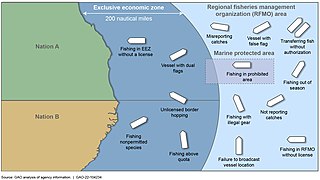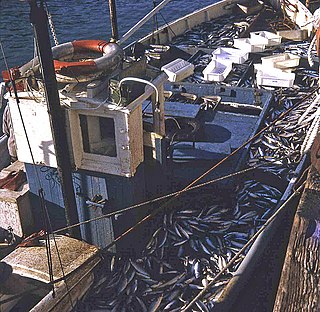This article needs additional citations for verification .(November 2020) |
The National Federation of Fishermen's Organisations (NFFO) is a main British trade organisation representing British fishermen, in relation to European fishing regulations.
This article needs additional citations for verification .(November 2020) |
The National Federation of Fishermen's Organisations (NFFO) is a main British trade organisation representing British fishermen, in relation to European fishing regulations.
It was founded in 1977, in relation to new European regulations which were enacted in 1983.
The organisation was incorporated in June 2008.
It is headquartered in central York. [1]
A division of the organisation provides training for British fishermen.

The Common Fisheries Policy (CFP) is the fisheries policy of the European Union (EU). It sets quotas for which member states are allowed to catch each type of fish, as well as encouraging the fishing industry by various market interventions. In 2004 it had a budget of €931 million, approximately 0.75% of the EU budget.

Commercial fishing is the activity of catching fish and other seafood for commercial profit, mostly from wild fisheries. It provides a large quantity of food to many countries around the world, but those who practice it as an industry must often pursue fish far into the ocean under adverse conditions. Large-scale commercial fishing is also known as industrial fishing.

The Magnuson–Stevens Fishery Conservation and Management Act (MSFCMA), commonly referred to as the Magnuson–Stevens Act (MSA), is the legislation providing for the management of marine fisheries in U.S. waters. Originally enacted in 1976 to assert control of foreign fisheries that were operating within 200 nautical miles off the U.S. coast, the legislation has since been amended, in 1996 and 2007, to better address the twin problems of overfishing and overcapacity. These ecological and economic problems arose in the domestic fishing industry as it grew to fill the vacuum left by departing foreign fishing fleets.
Panglima La'ôt is a tribal leader in fishing community in Aceh province of Indonesia. He constitutes to organise Hukôm Adat La'ôt. The law, which is developed upon the basis of Islamic Law and is not set out in writing, consists of a system of marine laws and regulations; in regard, the sea is a source of work and welfare. It varies in detail depending on local conventions and type of fishing gear. Keeping pace with development in fisheries, the custom was developing more rapidly than other custom laws and covered most general procedures, including leader selection process, organisational structure, role and duty, etc.

Illegal, unreported and unregulated fishing (IUU) is an issue around the world. Fishing industry observers believe IUU occurs in most fisheries, and accounts for up to 30% of total catches in some important fisheries.
The Marine and Fisheries Agency (MFA) was an executive agency of the British government, founded on 1 October 2005, that controlled sea fishing in seas around England and Wales. Responsibilities included enforcement of sea fisheries legislation, licensing of UK commercial fishing vessels, sampling of fish catches, management of UK fisheries quotas and an advisory role and general liaison with the fishing industry. It received over £27 million in funding in 2009 and was replaced by the Marine Management Organisation on 1 April 2010.
The National Union of British Fishermen was a trade union representing fishermen in the United Kingdom.

The fishing industry in Scotland comprises a significant proportion of the United Kingdom fishing industry. A recent inquiry by the Royal Society of Edinburgh found fishing to be of much greater social, economic and cultural importance to Scotland than it is relative to the rest of the UK. Scotland has just 8.4 per cent of the UK population but lands at its ports over 60 per cent of the total catch in the UK.

Fishing in India is a major sector within the economy of India contributing 1.07% of its total GDP. The fishing sector in India supports the livelihood of over 28 million people in the country, especially within the marginalized and vulnerable communities. India is the third largest fish producing country in the world accounting for 7.96% of the global production and second largest producer of fish through aquaculture, after China. The total fish production during the FY 2020-21 is estimated at 14.73 million metric tonnes. According to the National Fisheries Development Board the Fisheries Industry generates an export earnings of Rs 334.41 billion. Centrally sponsored schemes will increase exports by Rs 1 lakh crore in FY25. 65,000 fishermen have been trained under these schemes from 2017 to 2020. Freshwater fishing consists of 55% of total fish production.

Canada's fishing industry is a key contributor to the success of the Canadian economy. In 2016, Canada's fishing industry exported $6.6 billion in fish and seafood products and employed approximately 72,000 people in the industry. Aquaculture, which is the farming of fish, shellfish, and aquatic plants in fresh or salt water, is the fastest growing food production activity in the world and a growing sector in Canada. In 2015, aquaculture generated over $1 billion in GDP and close to $3 billion in total economic activity. The Department Of Fisheries and Oceans (DFO) oversees the management of Canada's aquatic resources and works with fishermen across the country to ensure the sustainability of Canada's oceans and in-land fisheries.

Until the 1960s, agriculture and fishing were the dominant industries of the economy of South Korea. The fishing industry of South Korea depends on the existing bodies of water that are shared between South Korea, China and Japan. Its coastline lies adjacent to the Yellow Sea, the East China Sea and the East Sea, and enables access to marine life such as fish and crustaceans.
The Federation of Irish Fishermen (FIF) is the umbrella organization for the three main Fish Producing Organizations (FPOs) in Ireland. It consists of The Irish Fish Producers Organization Ltd (IFPO), The Irish South and West Fish Producers Organisation Ltd.(IS&WFPO), and The Killybegs Fishermen's Organisation Ltd (KFO). Currently, the FIF represents over 90% of the Irish fishing fleet.

Fishing in Cornwall, England, UK, has traditionally been one of the main elements of the economy of the county. Pilchard fishing and processing was a thriving industry in Cornwall from around 1750 to around 1880, after which it went into an almost terminal decline. During the 20th century the varieties of fish taken became much more diverse and crustaceans such as crab and lobster are now significant. Much of the catch is exported to France due to the higher prices obtainable there. Though fishing has been significantly damaged by overfishing, the Southwest Handline Fishermen's Association has started to revive the fishing industry. As of 2007, stocks were improving. The Cornwall Sea Fisheries Committee is one of 12 committees responsible for managing the corresponding Sea Fisheries District. The Isles of Scilly Sea Fisheries Committee is responsible for the Scilly district.
The fishing industry in England covers the fish processing industry and fishing trawler companies that fish around England.
As a trade association, the British Metals Recycling Association (BMRA) represents over 300 organisations working across UK’s metal recycling sector. Its website also helps members of the public to find a local metal recycling organisation. It is based in Cambridgeshire, England.
The Workers' Compensation Board of British Columbia, operating as WorkSafeBC, is a statutory agency that came into existence in 1917, after the provincial legislature put into force legislation passed in 1902. This legislation is known as the Workers Compensation Act.
The Australian Underwater Federation (AUF) is the governing body for underwater sports in Australia.
The European Diving Technology Committee eV. (EDTC) is an association registered in Kiel, Federal Republic of Germany for the purpose of making professional diving safer by creating international standards. Membership is open to all countries of the continent of Europe, with each country having one representative from the medical, industrial, government and trade union sectors. Some major diving industry associations are also involved. As of May 2016, 22 nations and 6 international non-governmental organisations were represented in the EDTC.

Fish for finance is a possible trade-off that has been considered by both sides in the trade negotiations between the United Kingdom and the European Union (EU) over their future relationship following Brexit in January 2020. The Brexit withdrawal agreement between the two parties called for an agreement on fisheries to be concluded by June 2020, followed by an agreement on financial services at the end of July, deadlines which were both missed. Both were expected to be part of the final EU–UK trade agreement reached by the end of 2020, the end of the Brexit transition period. The final agreement had some broad outlines for a future fishing deal, primarily gradual EU concessions of fishing quota in UK waters, but was largely silent on finance.
The Federation of Maritime Workers was a trade union representing sailors in the Netherlands.